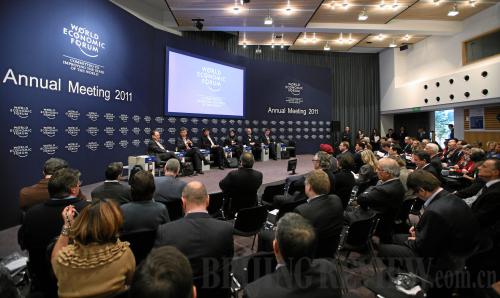|
 |
|
FOCUSING ON CHINA: Participants discuss China's innovation policies, legal reform, the future of real estate and the impact of China at the session "Insights on China" at the Annual Meeting of the World Economic Forum in Davos, Switzerland on January 26 (XINHUA/WORLD ECONOMIC FORUM) |
When more than 2,500 global government and business leaders and economists gathered in Davos, Switzerland for the World Economic Forum (WEF), January 26-30, many of them probably had the same question in mind: Is the world economic recovery sustainable?
The economic landscape is mixed. Developed countries are struggling to manage deflationary forces while emerging economies have swiftly escaped the quagmire. China, in particular, has steered a steady course through challenging economic times.
It's true the world economy is in a much better position than many expected a year ago. The U.S. economy, the largest in the world, is seeing light at the end of the tunnel as consumers open up their wallets again. Although Europe is buckling under a mountain of debt, it has so far avoided the worst-case scenario—a collapse of the euro.
But pessimists are worried the financial crisis was not just a temporary, cyclical downturn, but the beginning of a prolonged downturn.
Given continued economic uncertainty and trouble, many people looked to the five-day meeting—which adopted the theme "Shared Norms for the New Reality"—for insight on the world's economic future.
According to Kalus Schwab, founder and Chairman of the WEF, "the world has fundamentally changed, and this is the new reality." Schwab noted that an important aspect of this new reality is China's rise.
China was well-represented in Davos. With its economy gaining clout, China sent its largest delegation ever to this year's forum, spearheaded by business leaders seeking to succeed on a world stage previously dominated by Western companies.
Robert Greenhill, WEF's Chief Business Officer, said China's importance at Davos is "a reflection of the accelerated leadership of China in the global and economic and intellectual discussions."
The WEF invited the first Chinese delegation to Davos in 1979. In September 2007, it held the first Summer Davos forum in China as the world showed an increasing interest in the vibrant Chinese economy.
Bright outlook
 |
|
CHINA'S VOICE: Chen Deming, Minister of Commerce, attends a press conference on the 10th anniversary of China's entry into the WTO during the Annual Meeting of the World Economic Forum in Davos, Switzerland on January 27 (XINHUA/WORLD ECONOMIC FORUM) |
Even during the worst periods of the financial crisis, China's economy was widely viewed as an island of stability.
The Chinese economy has obviously found its feet, reducing the possibility of a double dip as post-crisis stimulus measures are withdrawn, said Zhu Min, a senior advisor at the International Monetary Fund (IMF) and former Vice Governor of the People's Bank of China.
He said China has become a significant growth engine for the world economy, and he expects the Chinese economy to grow 9.5 percent in 2011.
"But the country still has a long way to go to readjust its economy to rely more on domestic demand," he said. "After all, the economy remains heavily reliant on fixed-asset investments like infrastructure construction and real estate development, which are unsustainable."
Zhu also suggested China make a push into hi-tech and capital-intensive sectors and move some labor-intensive businesses to western regions.
But China has woes of its own. Due to a two-year lending spree, a flood of low-interest credit has found its way into the economy, fueling inflationary jitters and property market fever across the country. Worse still, fears are proliferating that unbridled printing of dollars in the United States will compound China's inflationary headache.
Liu Mingkang, Chairman of the China Banking Regulatory Commission, said policy-makers are concerned about inflation and will take measures to curb the consumer price surge. But the government has not set any target for new loans this year, he said.
Liu added that China is pushing forward structural reforms to make its economy "lighter and greener."
Li Daokui, adviser to the Monetary Policy Committee of the People's Bank of China and Director of the Center for China in the World Economy at Tsinghua University, said it is necessary to further increase interest rates and allow the yuan to gain about 5 percent in value annually to rein in inflation and combat the surge in property prices.
The real estate bubble is the biggest danger to China, a thousand times worse than inflation, he said.
| 